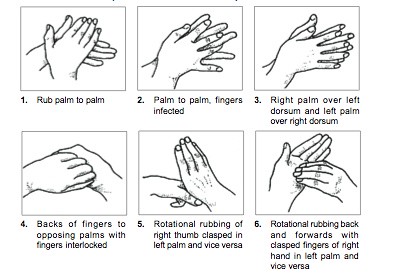Cold and flu season is in full force in Vancouver and it’s the time of the year where many of us experience the wheezing and coughing of the common cold. Without fail, cold and flu season pays us a visit each year and yet many people are not prepared. Granted, taking preventive measures can be intimidating; nowadays, there are so many suggestions out there on how to prevent colds, from avoiding contact with others to chewing raw garlic cloves, that it makes you wonder “What methods really work?” Well, according to a recent review paper, preventing colds can be quite simple.

Image from Wikimedia Commons
The authors of the review investigated the proof supporting preventive measures and treatments for the common cold. According to Allan et al. (2014), a cold is a viral disease that is transmitted via hand contact (directly or indirectly) with germs from a sick individual. Avoiding hand contact with others can be difficult, especially if you’re a university student that takes public transportation every day like me. If you can’t avoid hand contact, then the best thing you can do to prevent a cold is to keep your hands as clean as possible. This may seem obvious, but studies have shown that 95% of people don’t wash their hands properly. If people were more compelled to wash their hands, then we would probably see a decrease in the number of colds. In the review, 67 randomized controlled trials showed that washing your hands works when it comes to preventing the spread of colds. Using hand sanitizers, antibacterial hand wipes, and gloves were also found to be effective.

Make sure you’re washing your hands properly!
Another method that’s effective for thwarting colds, especially for children, is to take zinc supplements. The review studied two randomized controlled trials where children were either given 10 or 15 mg of zinc or a placebo every day. The authors found that the average number of colds was considerably lower among the children who took zinc than the children who took a placebo. The number of sick days from school was also lower in the zinc group than the placebo group. In one of the trials, the percentage of children who took zinc with no colds was 33% while the percentage of children who took a placebo with no colds was 14%. Even though the trials only examined children, the authors recommend zinc supplements for adults as well.

The recommended daily dose of zinc for men and women are 11 mg and 8 mg, respectively.
At some point in our lives, all of us have experienced the joy of the common cold. Not only do colds make us feel miserable with symptoms like sore throats and stuffy noses, they can cost us money and time from work or school. With the proven preventive measures suggested by the authors of the review, no longer do we have to be confused on how to ward off a cold. Let’s become our own bodyguards during cold and flu season!

Check out this video for more tips on how to prevent colds!
– Maria Bui
References:
Allan, G.M. and Arroll, B. 2014. Prevention and treatment of the common cold: making sense of the evidence. CMAJ : Canadian Medical Association journal = journal de l’Association medicale canadienne. 186(3): 190.
